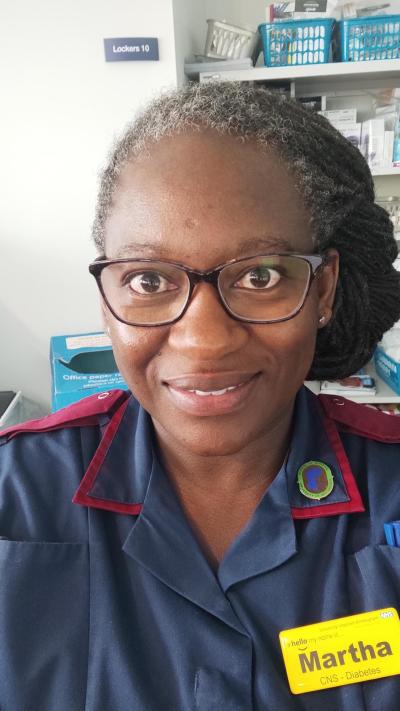Martha Stewart is a Diabetes Specialist Nurse (DSN) at University Hospitals Birmingham and a Senior Lecturer in Advancing Diabetes Care at Birmingham City University.

I have been a registered nurse since 2002 and have the privilege of having a dual role as both a Diabetes Specialist Nurse and a Diabetes Lecturer.
A tale of two roles
I don’t exactly have a typical day because I have two jobs, which feed into each other. For two and a half days of my week, I work as a diabetes nurse specialist (DSN) at the Queen Elizabeth hospital, where I rotate between inpatients and outpatients. When I am on the wards, my colleagues and I triage and share out the referrals that the ward staff make to our team. Typical referrals are for educating patients who are new to insulin or adjusting patients’ diabetes medication doses. I enjoy working on the wards because I also get to interact with the staff who are looking after the patients.
Patients are admitted to hospital for all sorts of reasons. If they have diabetes their care can become very complex. This gives us the opportunity to share our diabetes expertise and provide some staff support and education where it’s needed. As non-medical prescribers, we prescribe and adjust diabetes medication doses. This helps to minimise delays in initiating and changing medication doses as well as helping reduce delays in patient discharge.
Working in various clinics
Outpatient work is equally stimulating because sometimes I get to meet the people I met in the hospital while they were poorly. It’s lovely to have that continuity and follow them on their diabetes journey. Most of our clinic appointments have remained virtual since the Covid-19 pandemic started. Different patients will have their preferences, for example, some will need to come in for insulin education. Many patients have become used to telephone or video reviews.
Clinic work includes educating patients who are starting a new medication. We also take telephone calls from people who are at home and need some advice on various aspects of their diabetes.
Sometimes, people will ring just to talk, and this is one of the side-effects of the Covid-19 pandemic. The fact that some people are lonely and isolated because of the need to isolate to prevent the spread of the infection. I love talking to these kinds of patients, whose diabetes is well controlled, but they haven’t seen or spoken to anyone for a few days. There is a lot of strain on various health and social care services, but we should not forget our humanity as healthcare professionals.
"As the number of people with diabetes continues to rise, the role of diabetes specialist nurses and others involved in caring for people living with diabetes is more important than ever and alongside the expertise that we impart, we should not forget to be compassionate practitioners."
My role as a lecturer in advanced diabetes care
On the other two and a half days of my week, I am a lecturer on BCU’s MSc in Advancing Diabetes Care course. This is an online course, launched in 2019 and most of our students are doctors specialising in diabetes, based in India. This role works hand in hand with my clinical nurse specialist role. I believe that it is important as an educator, to maintain one’s clinical experience where possible, because this helps to link theory with practice.
My journey into teaching began in Zimbabwe, where I was a teacher before I trained as a nurse at the University of Nottingham. I have always enjoyed teaching and I entered the world of diabetes as the first Diabetes Educator at University Hospitals Birmingham, teaching nurses about diabetes. A typical day in my teaching role involves facilitating webinars where guest lecturers present to the students online and marking assignments.
A large portion of time involves updating the online resources and content that the students use on the course. One of the aspects that I have enjoyed from my teaching role is meeting and getting to know our students and learning from them. The challenges, successes and innovations that they encounter in their local diabetes practice.
The course is very much a balance of offering the resources that we have and learning from the students. As with seeing patients improving, I really enjoy seeing students start to understand that our course goes further than just learning the content and passing assignments. We aim to encourage ‘compassionate competence’, which involves working in partnership with the person living with diabetes and sharing decision-making. Whilst the healthcare professional is an expert in diabetes, the person living with diabetes is an expert in their own life.
Final thoughts
As the number of people with diabetes continues to rise, the role of diabetes specialist nurses and others involved in caring for people living with diabetes is more important than ever and alongside the expertise that we impart, we should not forget to be compassionate practitioners.
A quote from Maya Angelou that inspires me: "My mission in life is not merely to survive, but to thrive; and to do so with some passion, some compassion, some humour, and some style."
